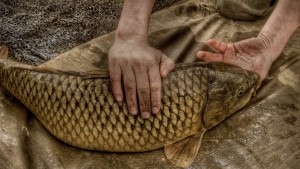A joint Bournemouth University(BU) & Environment Agency (EA) study, published in the Public Library of Science journal ‘PLoS One’, has revealed how infections of the tapeworm Bothriocephalus acheilognathi affect juvenile carp Cyprinus carpio in fisheries in England andWales.
 Dr Chris Williams from the EA said: “This work provides important evidence about how alien parasites can cause harm to our fish populations. It gives us a better understanding of the risks these parasites pose to fish, the environment and our fisheries.”
Dr Chris Williams from the EA said: “This work provides important evidence about how alien parasites can cause harm to our fish populations. It gives us a better understanding of the risks these parasites pose to fish, the environment and our fisheries.”
The study showed the parasite comprised up to 12 % of an infected carp’s body weight. The tapeworm was always found in the intestine, causing considerable damage. Infected fish were found to be lower in weight, growing more slowly and feeding on less nutritive foods.
Dr Robert Britton, who led the study from BU’s ecology department, said: “It was highly apparent that infected carp suffered multiple pathological and ecological consequences, suggesting fisheries infected with Bothriocephalus will be damaged.”
The fact that carp fisheries and the recreational value of carp fishing are worth millions of pounds to the UK economy means it is vital to prevent infection. Fortunately, the Asian tapeworm is currently subject to strict regulation inEnglandandWalesby the Environment Agency.
Dr Williams continued: “We will use this knowledge to advise our regulation of fish movements and the advice we provide to fishery managers to minimise the spread and impact of these parasites.”











 Dr. Ashraf cited on ‘Modest Fashion’ in The Guardian
Dr. Ashraf cited on ‘Modest Fashion’ in The Guardian NIHR-funded research launches website
NIHR-funded research launches website Academics write for newspaper in Nepal
Academics write for newspaper in Nepal New paper published on disability in women & girls
New paper published on disability in women & girls Global Consortium for Public Health Research 2025
Global Consortium for Public Health Research 2025 MSCA Postdoctoral Fellowships 2025 Call
MSCA Postdoctoral Fellowships 2025 Call ERC Advanced Grant 2025 Webinar
ERC Advanced Grant 2025 Webinar Horizon Europe Work Programme 2025 Published
Horizon Europe Work Programme 2025 Published Horizon Europe 2025 Work Programme pre-Published
Horizon Europe 2025 Work Programme pre-Published Update on UKRO services
Update on UKRO services European research project exploring use of ‘virtual twins’ to better manage metabolic associated fatty liver disease
European research project exploring use of ‘virtual twins’ to better manage metabolic associated fatty liver disease